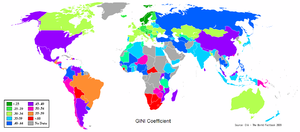
- Image via Wikipedia
Lets review the events of the past few days and see what has been accomplished after spending a billion dollars and having an estimated 19,000 law enforcement officers protecting the summits.
Here are the key areas discussed at the summits:
- The European-turned-global financial crisis.
- Devastation to trade, investment and development caused by financial crisis.
- Environmental and social problems from climate change and energy to food and health.
- Strengthening the G20 itself and the international financial institutions and other global bodies to effectively address the complex, uncertain, intensely interconnected world.
According to Associated Press, the leaders at the summits failed to resolve their differences on economic strategy with U.S. wanting to continue spending on economic stimulus whilst European countries and Japan wanting to cut back on spending and reduce their deficit. In the end they agreed to reducing their deficit by half by 2013. On foreign policy they couldn’t agree on a strong condemnation of North Korea and stronger sanctions against Iran.
According to the Accountability Report, the G8 past commitment to women and men living in poverty globally was $50 billion USD and the members have missed that target by at least $18 billion. There was no mention on how they plan to address this gap.
Now, lets see what the protesters are asking:
They want a fairer and greener world. They want G20 to do more than just save the banks. They want them to protect the poorest from impact of globalization. They want world leaders to consider the well-being of the poor and the vulnerable people. They want to see the world’s poorest countries at the table.
They want the world leaders to do more to address climate change. They believe economic security can only be obtained if the leaders address environmental sustainability and equality. They see return to “business as usual” not a sustainable option. They see the G20 dominance of capitalism as the main source of the problem.
Now, lets see what a global poll shows:
Extreme poverty is more serious problem for the world than climate change, terrorism, or the state of the global economy, according to a new annual global poll conducted by BBC World Service across 23 countries. 25,000 people were interviewed and asked to rate the range of global problems. Here is the percentage of people each problem as very serious.
- 71%—extreme poverty
- 64%—the environment or pollution
- 63%—the rising cost of food and energy
- 59%—the spread of human diseases
- 59%—terrorism
- 58%—climate change
- 59%—human rights abuses
- 58%—the state of the global economy
- 57%—war or armed conflict
- 48%—violation of workers’ rights
In your view, are the leaders of G20 on the same page as the people they represent? Have we setup a good example by spending over a billion dollars on the summits whilst the average person is asked to save more? Do you feel Toronto’s image as a tourist destination has improved or do you feel you are misled?
![]() Loading ...
Loading ...











